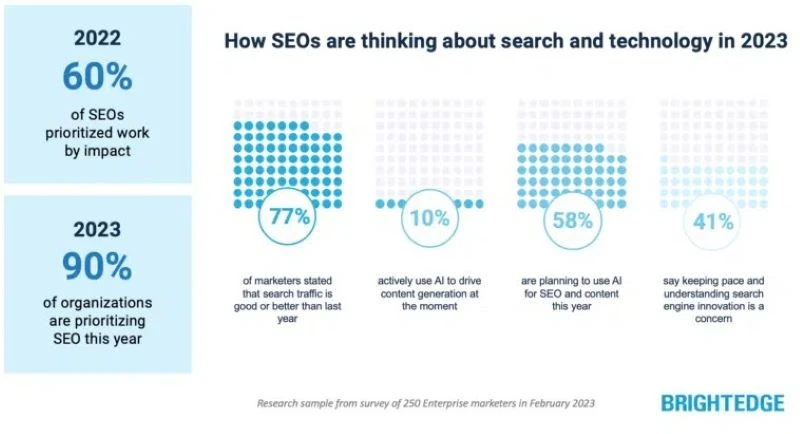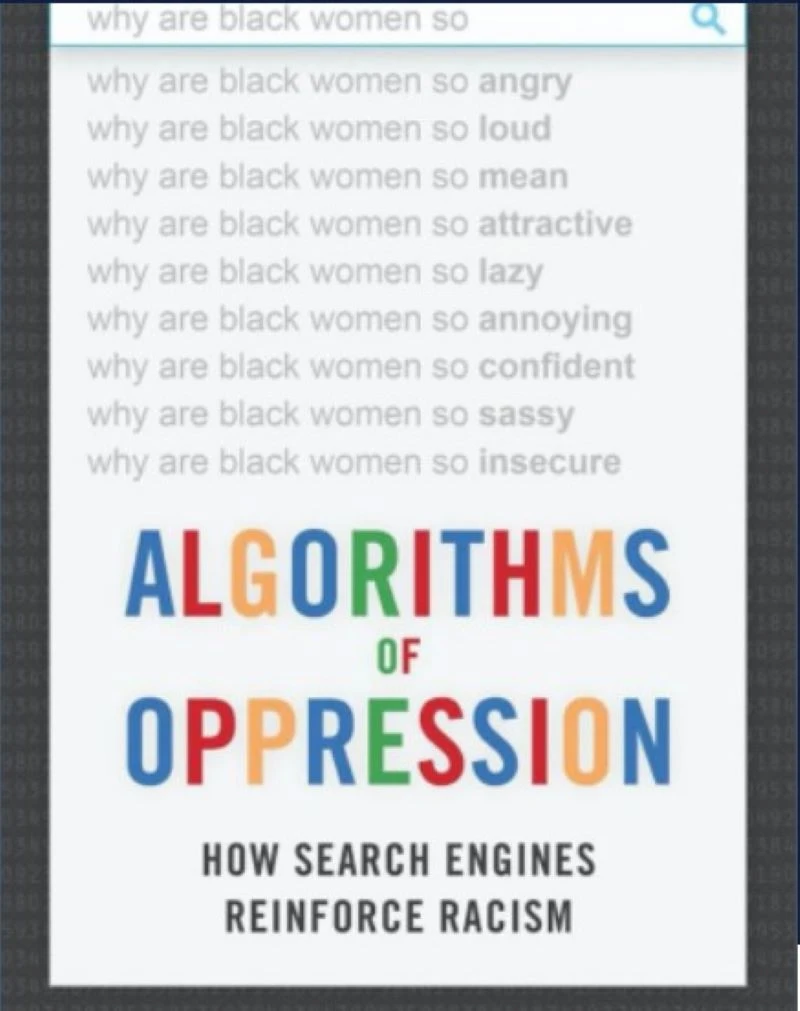Navigating AI and SEO: Ethics and Opportunities
SEO professionals have had a topsy-turvy relationship with artificial intelligence (AI).
When AI first emerged, there was a deep fear (even if some weren’t willing to admit it) that the technology could replace humans.
However, the more SEO professionals used AI tools, the more they saw their value in speeding up content creation.
Recently, content writers have started to realize some of the limitations of generative AI. AI output is still void of human creativity and the randomness of thought that separates unique content from generic.
As we enter 2024, smart SEOs have learned to use AI to their advantage. But with any technological breakthrough, questions arise about its ethical use.
In this blog, we will:
- Explore how AI has changed SEO.
- Define AI ethics and its relevance to SEO.
- Discuss the challenges and potential risks of AI-powered SEO.
- Explain how to address ethical questions related to AI.
- Explore the future of AI ethics and SEO.
The AI revolution in SEO
AI doesn’t just help write articles. It optimizes all aspects of the SEO process. Let’s explore a few of its uses.
Advanced keyword research
AI and its machine-learning capabilities can analyze substantial amounts of data to recommend the most appropriate keywords for a blog. It doesn’t only consider the keyword itself but also the context, user intent, and sentiment behind it to offer personalized recommendations. This helps a blog rank well and makes it visible to the intended audience.
Content optimization
You can feed legacy content to AI, and it will evaluate it for factors like readability, keyword density, length, and structure and offer recommendations. Content professionals know better than anyone how hard it is to keep creating new and unique content – this is a great way to repurpose and relaunch existing content.
SEO strategizing
The essence of AI is its predictive analytics capabilities, where it analyzes a wide range of data to predict the future. By using AI to help forecast upcoming trends, content writers can get the jump on competitors and strategically release content throughout a three-, six-, or 12-month period, with each content piece relevant to the target audience.


Website optimization
AI can audit your website and suggest improvements in design and layout to match your user’s browsing habits, which does a world of good in building user-friendly experiences.
AI tracking
AI tracking can refer to any sort of data tracking — customer data, content performance data, and more. Where the technology really shines is in analyzing the data and consolidating multiple signals into a single view.
Platforms like Nightwatch now provide a complete AI tracking and brand monitoring solution: visibility across LLM responses, the search engines those AI systems use for up-to-date answers, prompt research to see how brands and competitors surface, and citation-level sentiment analysis powered by the Nightwatch SEO Agent. Because Nightwatch combines LLM monitoring, search engine tracking, prompt insights, and sentiment in one place, teams avoid juggling separate tools for each part of the workflow.
Algorithms can analyze huge amounts of data much faster than people can, and the results they produce are far more accurate. From employee tracking to root out toxic company culture to tracking your latest email marketing campaigns, AI is your ace in the hole for creating a data-driven company. This is especially true when using AI for text marketing. AI can personalize messaging, optimize timing, and analyze customer responses, ensuring that text-based campaigns are more effective and engaging. By leveraging AI-driven automation, businesses can enhance customer interactions while maintaining a human touch.
And a data-driven company should be your goal if you want to succeed in today’s competitive landscape. They’re 23 times more likely to gain new customers over companies that don’t focus on data. It’s time to use AI to your advantage.
Problems with using AI for SEO
There’s no doubt about it. There are plenty of upsides to using AI in SEO. However, it’s not all sunshine and rainbows. We have to be careful about how much we rely on AI to help us with various SEO tasks.
Why? AI is constantly evolving, and there are still kinks that need attention before we can fully embrace it. That said, here are some problems to keep an eye on when tapping into the power of AI for SEO.
- Search result bias: If an algorithm is trained on data with historical biases, it may perpetuate these. For example, certain websites or types of content, particularly from well-established or dominant sources, might consistently rank higher, while newer or smaller voices struggle for visibility.
- Keyword and content bias: AI tools used for keyword optimization can lead to a homogenization of content. Websites might tailor their content excessively to meet AI-determined SEO criteria, potentially at the cost of creativity and variety. This can lead to an internet where diverse voices are underrepresented.
- Personalization and privacy concerns: AI-driven personalization of search results, while beneficial in delivering relevant content to users, raises privacy concerns. The collection and analysis of personal data to tailor search results can lead to ethical issues related to user consent. Storing and running your data analytics on bare metal cloud servers can help enhance the security of that data.
- Misinformation and manipulation: There’s a risk that AI tools might be built to generate misinformation or biased content.
- Transparency and accountability: The lack of transparency in how AI models are trained complicates efforts to hold search engine providers accountable for biased or unfair outcomes.
As a result, AI ethics should concern any SEO professional.
Prioritize trust
On the first level, public trust depends on the ethical use of AI. People who perceive they are being manipulated or fed biased information can lose trust, damaging the reputation of the companies producing such suspect content — which can be difficult to recover from.
While search engines like Google don’t penalize AI content, SEO professionals must be aware of any biased content production to ensure their strategies don’t contribute to or reinforce existing inequalities.
With a long-term strategy that prioritizes customer needs, preferences, and sentiments over producing fast and unaudited AI content, SEOs will experience success.
Case Studies of note and other considerations
AI bias concerns have been around long before the OpenAI explosion in 2026. Safiya Umoja Noble, a communications professor at USC Annenberg, highlighted this issue in her 2018 book “Algorithms of Oppression.”


She discovered that when searching for the term “black girls,” inappropriate or explicit content dominated the search results. This indicated a bias in the algorithm, associating certain racial or ethnic groups with negative and harmful stereotypes. This case was particularly concerning because it had the potential to perpetuate and reinforce harmful societal stereotypes.
AI bias in content creation manifests in various forms, often reflecting the data it’s trained on or the inherent biases of its creators.
For example, when we prompted ChatGPT to describe a typical Monday morning for a husband and wife with two kids, it created a story where the wife prepares breakfast, reinforcing the harmful stereotype of “women belonging in the kitchen.”
Side note: If you prompt Chat GPT to make this image now, it’s always the father who is cooking! What does that mean? There’s an element of change and fluidity in AI that’s challenging to keep tabs on.
Larger-scale studies have been conducted to explore this further.
In one study, the AI model GPT-3 demonstrated a tendency to associate certain words with gendered pronouns in a stereotypical manner. For example, it was more inclined to use words such as “naughty” or “sucked” alongside female pronouns. Conversely, male pronouns were often accompanied by descriptors like “lazy” or “jolly.”
The study also revealed biases in the context of religion. The term “Islam” frequently appeared in proximity to words like “terrorism,” whereas “Atheism” was more likely to be associated with terms such as “cool” or “correct.”
Such biases aren’t just academic concerns but have practical implications, especially in areas like automated news generation or content summarization. The skew towards negative sentiment, particularly in racial contexts, can significantly influence the tone and substance of the generated content, potentially leading to unintended consequences.
AI voice generation technology is another example of why AI ethics is essential. This innovation transforms written text into spoken words, offering immense benefits like aiding individuals with reading challenges or visual impairments. However, ethical challenges emerge when considering its potential for misuse, such as creating fake audio clips that could deceive listeners. It’s also essential to ensure privacy and copyright are laws are observed when AI voice cloning is used.
To address these concerns, ethical principles in AI must ensure that such technology is used responsibly, safeguarding individuals from harm and preventing the spread of false information.
Navigating AI dilemmas in SEO
SEO professionals should consider some of the recommended guidelines when producing blogs with AI.
Offer transparency
If using AI images as part of your blogs, make it known how they may not represent true realism. If AI influences your blog content, you can disclose it in the footer or editor’s notes.
Supplement, don’t replace
Nobody should be directly copying and pasting large chunks of AI content and passing it off as a blog without editing and supplementing it with human creativity and insights. The human writer should still drive the content’s core. That also gives you an opportunity to ensure it meets ethical standards and is void of misleading information. AI can enable faster content production, but ensuring that each piece is valuable, accurate, and well-crafted is essential.
Keep applying SEO best practices
These include:
- Well-researched content that addresses audience needs and desires.
- Using relevant keywords and blending them naturally.
- Making good use of H1 and H2 headings.
- Writing clear meta titles and descriptions.
- Using structured formatting, such as lists and tables, where appropriate.
- Relevant link building.
- Updating the content regularly.
The future of AI and SEO
AI regulation is going to play a big part in 2026 and beyond. For instance, the EU AI Act has been created to ensure the proper use of AI.
In October 2023, the United States, too, issued an Executive Order on the use of AI. It primarily focuses on promoting responsible AI development and use. It establishes policies and principles emphasizing safety, security, innovation, and adherence to democratic values.
The order directs the formulation of AI guidelines, ensuring safety, security, and ethical standards. It also highlights the Federal Government’s commitment to fostering responsible AI practices domestically and internationally, covering aspects such as equity, civil rights, labor, consumer protection, and global collaboration.
The regulatory domain for AI is likely to evolve. While some regulations are specific to AI, others are likely to be adaptations of existing laws to the emerging challenges posed by AI. It’s important to keep these things in mind since most companies plan to be mostly powered by AI.
SEO professionals are encouraged to maintain an ongoing awareness and active engagement in ethical AI practices. As the field of SEO continues to evolve with AI advancements, it’s crucial to prioritize responsible usage, ensuring fairness, transparency, and respect for user privacy.
Author Bio
Outreach Specialist at LeadsBridge, passionate about Marketing and Technology. My goal is to help companies improve their online presence and communication strategy.
